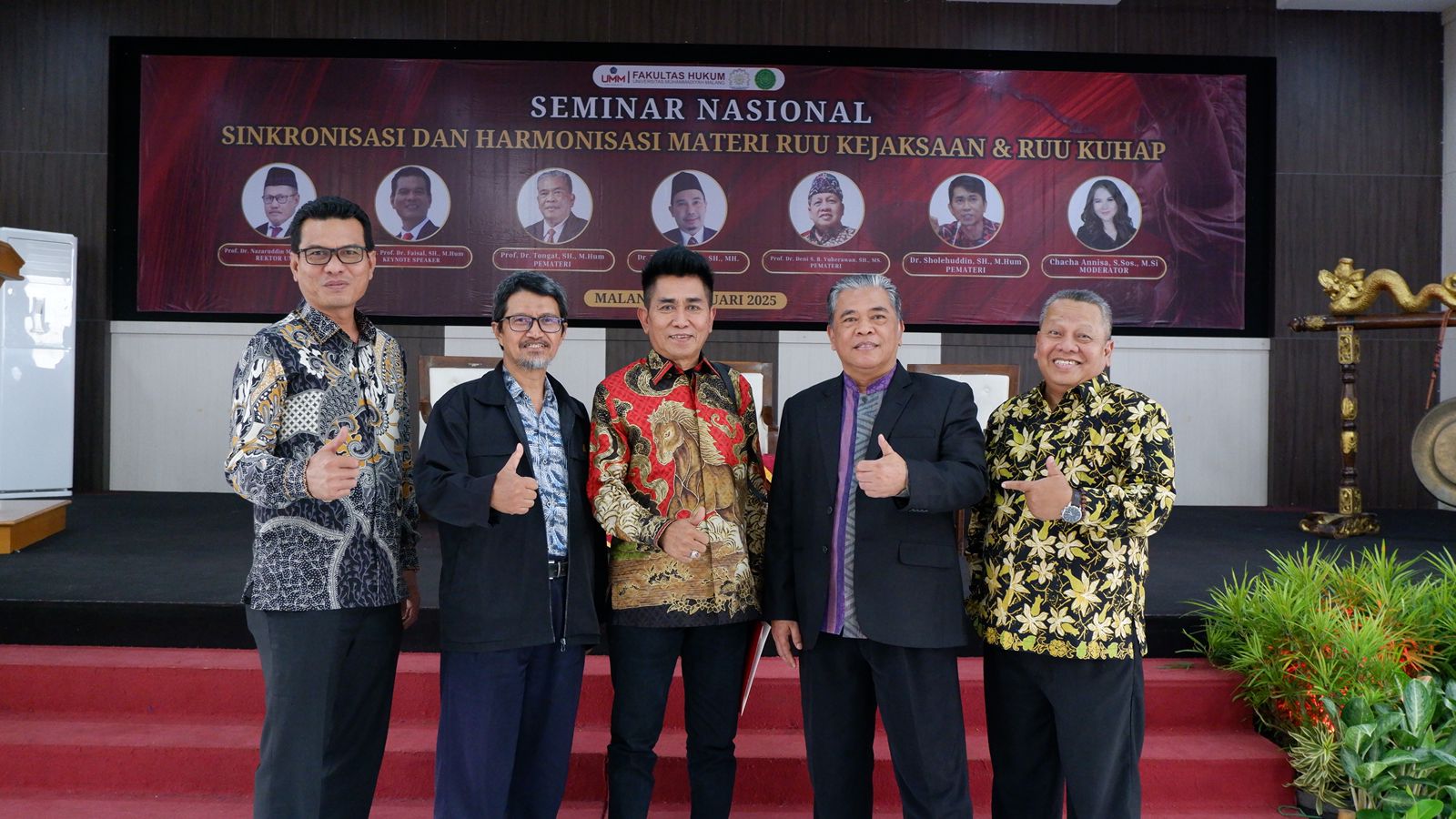
Malang (30/1) - FH UMM again held a National Seminar (Semnas) in collaboration with the FH PTMA Dean's Forum. Today's national seminar agenda discusses the synchronization and harmonization of material on the Prosecutor's Bill and the Criminal Procedure Code Bill. Also present were a number of reliable speakers and legal experts from academics and practitioners. They studied the importance of adjusting and aligning prosecutorial legal regulations with the Criminal Code in order to create a more effective and just justice system.
The seminar began with the Chair of the PTMA Law Faculty Dean's Forum, Assoc. Prof. Dr. Faisal, S.H., M.Hum., who highlighted the urgency of synchronizing the Prosecutor's Bill and the Criminal Code to ensure efficiency and clarity in the legal process in Indonesia. He emphasized that regulatory changes must pay attention to the principles of justice and legal certainty. "Adjusting prosecutorial regulations and the Criminal Code is a must to ensure that our criminal justice system runs more efficiently and in line with developing legal needs," he said.
Then there was a presentation from the Dean of FH UMM Prof. Dr. Tongat, S.H., M.Hum. regarding restorative justice and its urgency as a resolution of criminal cases in the perspective of the Prosecutor's Bill and the Criminal Procedure Code Bill. He conveyed a series of criticisms of criminal justice, namely privatization, stigmatization, and dehumanization. Prisonization is the process of interaction between suspects, defendants and convicts within institutions which results in the transfer of knowledge about crimes.
"Meanwhile stigmatization is the giving of stigma and a label of evil. Lastly, dehumanization is the process of alienating and alienating humans from their social community," added Tongat.
Meanwhile, Chairman of the PP Muhammadiyah Law and Human Rights Council, Dr. Trisno Raharjo, S.H., M.H., explained criminal law policies in carrying out the duties of the prosecutor's office of the Republic of Indonesia. According to him, in carrying out their duties, prosecutors must adhere to the principles of justice and proportionality to prevent abuse of authority.
"The prosecutor's duties in enforcing the law must always be based on the principle of legality and upholding human rights," he stressed.
Trisno also highlighted the challenges in the prosecutor's legal practice, including how to balance repressive and preventive aspects in enforcing the law. According to him, experts and practitioners must ensure that criminal law reform not only strengthens the authority of the prosecutor's office but also guarantees people's rights in the legal process.
This discussion was then reinforced by the second speaker, Dr. Sholehuddin, S.H., M.Hum., who reviewed the synchronization and harmonization of the content of the Bill regarding prosecutors towards the Criminal Code. According to him, regulatory disharmony could have implications for overlapping authority and legal uncertainty in the law enforcement process in Indonesia.
"The Prosecutor's Bill must be drafted taking into account its relationship with the Criminal Code so that there is no clash of norms that could hamper the judicial process," he said.
Apart from that, alignment between the role of the prosecutor's office in the justice system and applicable legal norms is also needed. Without good synchronization, differences in legal interpretation will emerge which can have an impact on uncertainty in law enforcement. Lastly, coordination between law enforcement agencies must also be considered to avoid conflicts of interest.
Furthermore, in his opening speech, UMM Chancellor Prof. Dr. Nazaruddin Malik, M.Sc. also advised that the role of academics is very important in providing constructive input for national legal policy. He hopes that this seminar can become a forum for scientific discussions that contribute to the preparation of better legal regulations.
In a separate place, Wahyudi Kurniawan, SH., M.H.Li, as chairman of the committee, said that through this agenda, campuses and academics are trying to contribute ideas related to synchronization and harmonization of regulations in criminal procedural law, which in this context is the Prosecutor's Bill and the Criminal Procedure Code. Wahyudi added that collaboration between academics and the government could make the country run as it should. (vin/wil/saf)